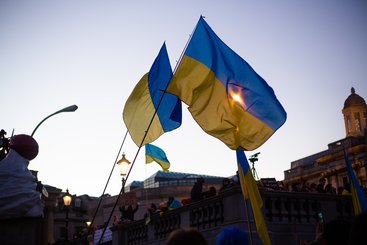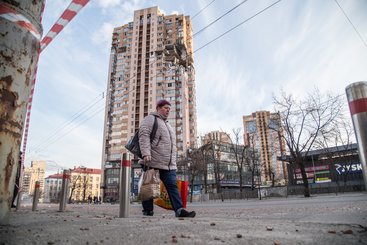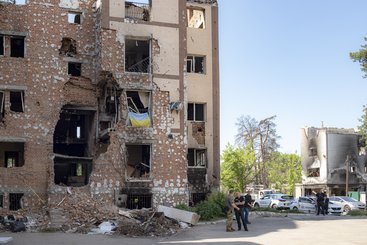ODI’s conference on Geopolitical risks to Ukraine’s reconstruction in June had, as one of its byproducts, a personal invitation to me to go to Kyiv to meet entrepreneurs, liberal politicians, academics and others; to meet face-to-face; to talk and listen. The trip happened last week.
The main evidence of war in Kyiv was a series of loud bangs in the middle of the night – Russian rockets meeting Patriot Missiles, apart from the one which got through and hit a power plant.
Otherwise, Kyiv is a normal and beautiful, bustling European city of 3.5 million people, with busy pavement cafes and restaurants, flourishing shopping centres and street stalls, traffic jams and young people zooming around on e-scooters.
After a while you notice the burly off-duty soldiers in uniform, the exhibitions in civic squares honouring war casualties and the forest of flags to the memory of those who died in Maidan Square in the 2014 Orange revolution. So, not so normal. A war for national survival is taking place, to expel the Russian invaders.
One of the practical consequences of the war is that airports are closed. The express route is a 15-hour bus ride from Warsaw. My hosts expressed great appreciation for an in-person visit from the UK. In fact, there was unaffected praise and thanks, more generally, for the generous support the UK has been providing. Whatever your views of the Boris Johnson era, and mine are negative, he made the right call on the Ukraine war. Continued British and other backing, with weapons and economic aid, remains vital for what could be a long struggle: easy to say but harder to deliver when there are already difficult issues around the public finances (and other moral imperatives such as our aid to the poorest countries).
By contrast, other supporters have started to wobble. Most seriously, a row has broken out with Poland, hitherto one of Ukraine’s staunchest backers. Putin’s blockade of Ukraine’s grain exports from the Black Sea has led to some diversion to Europe, depressing prices resulting in protests from farmers. There is an election looming in Poland, with a rapidly growing anti-Ukrainian populist party (also antisemitic, misogynist and homophobic). The government has played to the nationalist gallery, blocking not just Ukrainian grain exports but badly needed military supplies. And on the bus back, crossing the Polish frontier, I saw ridiculous and petty Polish bureaucracy making Ukrainians feel decidedly unwelcome. Elsewhere in Europe, pro-Russian parties continue to make progress – most recently in Slovakia – sapping political support for the Ukrainians.
The crucial ally is the US and, while President Biden continues to deliver the high-tech weaponry Ukraine needs, there is strong resistance from Republicans in the House. The prospect of a second Trump presidency is all too plausible. I was repeatedly told that the Ukrainians’ great fear is not the Russians, who are in retreat, but that the West is losing interest and patience when what is needed is stamina and a willingness to stay with Ukraine’s slow but successful military campaign.
I saw the reasons why Ukraine regards the war as a life-or-death struggle. At Irpyn, despite rapid rebuilding, there is abundant evidence of systematic bombing of civilian housing. In the town cemetery are the bodies of Ukrainians killed trying to escape. Serious people talk of a genocide in occupied territories with much yet undiscovered or unreported.
Before war crimes can be pursued there is important humanitarian work to be done. I met women, their faces etched with anxiety, whose partners are in Russian POW camps. Prisoner swaps should be negotiable. Then there is the appalling abduction and theft of children. The more time passes the chances of tracing and returning the children diminish.
I became involved in Ukraine because of the economic issues around reconstruction. A few months ago, the main multilateral agencies estimated that around $400 billion was required but that sum is a big underestimate and escalating as the Russians try to, systematically, destroy Ukraine’s infrastructure. Investment cannot wait for the end of the war, which could be years away. Private investors are, however, unsurprisingly inhibited by war risk though Ukraine has offsetting advantages in an educated and skilled labour force. Western governments are worried about their own budgets.
It would greatly help to use the frozen assets of the Russian government and oligarchs. At present Western governments are worried about legal hazard if assets are confiscated, even though Putin’s Russia itself breaks every law in the book. Only the interest payments from holding the frozen assets are to be passed to the Ukrainians. A way forward could be to use the assets to provide guarantees. There is real urgency to get investment flowing and it isn’t happening.
President Zelensky rightly enjoys hero status at home and abroad. But mistakes have been made and acknowledged. One has been a failure to mobilise major countries of the Global South who trade with and politically indulge Putin’s Russia: India, China, South Africa, Brazil, Saudi Arabia. Despite its pro-Russian rhetoric, China is demonstrating serious limits to its ‘friendship without limits’ and is seen as useful on economic issues, nuclear safety and potentially reconstruction. The last thing Ukraine wants is to be used as a pawn in a new Cold War between the US and China.
Until I visited Ukraine to see for myself – my first visit since the Khrushchev era – I indulged in armchair statecraft and military strategy from the safety of my London suburb. I now realise how valuable overseas support is to the war effort, and how vital it is to sustain it as the war drags on.



